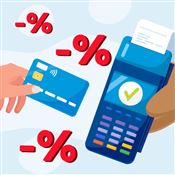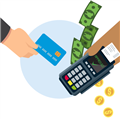Credit Card Surcharge
Credit card surcharges can help you save on processing fees. But are the cons worth it? Read on to find out.
 |
Credit card processing fees can be really expensive. So many businesses want to pass them on to customers through surcharging. It can save you money if your customers pay with credit cards.
That said, there's a lot to consider before you can surcharge your customers. It's even illegal in some states.
Read on to learn how surcharging works, the requirements, and the benefits and drawbacks.
Eliminate Credit Card Processing Fees With Surcharging
Accept Credit Cards at 0% Cost and Increase Your Margins Instantly
What Is a Credit Card Surcharge?
A credit card surcharge, also known as an extra checkout fee, is an additional fee for customers when they pay with a credit card.
It's meant to cover the credit card processing fees, since transaction fees for credit cards tend to be the most expensive. Merchants essentially pass on the fees to customers to save on payment processing.
Customers will see surcharges as a separate line item on their receipts.
However, surcharges are only allowed for credit cards. So, you'll still have debit card transaction fees, monthly fees, and other processor fees to consider.
Customers will have to pay the surcharge for credit card payments if a business imposes surcharges in its store. Unfortunately, there's no way around it unless they choose a different form of payment.
How Does a Credit Card Surcharge Work?
You can surcharge your customers in-person or online. Both will need to follow the rules of surcharging (discussed below). Additionally, in-person payments need a surcharge-compliant smart terminal.
The maximum credit card surcharge amount ranges from 2% to 4% of the total transaction cost. This cap depends on the state you operate in and the card brand being processed.
Remember, surcharges are used to cover the cost of credit card processing fees. So you can't exceed the cost of the fees, regardless of the cap. That said, customers may not be so stoked that they will be charged additional fees for using a credit card.
Here are the stats to be mindful of regarding customer behavior:
| How Does Surcharging Affect Customer Behavior[1] | |
|---|---|
| 11% | Customers that switched payment methods to avoid surcharges |
| 77% | Customers that prefer cash as an alternative to avoid surcharges |
| 44% | Customers that are extremely likely to switch merchants if surcharges are applied |
| 67% | Customers who view merchants negatively for applying a surcharge |
| 12% | Customers willing to pay a surcharge fee if asked |
| 88% | Customers who are aware of and have paid surcharges |
If you're thinking of surcharging, here are the rules you need to know.
Credit Card Surcharge Rules and Regulations
You need to make sure you're following credit card surcharge laws and the rules of card brands. Otherwise, you may incur hefty violation fees.
Here's what you need to know.
- Clearly display and communicate surcharge to customers.
- Set the surcharge to a maximum of 4% of the transaction or the cost of the processing fee (whichever is lower).
- Exclude debit card transactions from surcharges.
- Show surcharges on the receipts as a separate line item.
- Notify card brands that you plan to surcharge.
- Surcharges must be clearly communicated
Surcharges must be clearly displayed at checkout (whether online or in-store) and communicated to the customer. Card brands have their requirements on where to place the disclosure (see this section). - Surcharge can't go over the limit
Surcharges cannot exceed 4% of the transaction amount (depending on your state) or the cost of the processing fee, whichever is lower. - Debit cards can't be surcharged
Surcharges can only be allowed for credit cards. Debit and prepaid debit card transactions cannot have surcharges. - Notify card brands
You need to tell the card brands that you intend to surcharge. Each card brand has its own due date. Visa and Mastercard require you to inform them at least 30 days before imposing surcharges. - Choose product-level or brand-level surcharge
Decide at what level you will surcharge. You can't have both.A product-level surcharge applies to a specific type of credit card (for example, World Elite Mastercard). A brand-level surcharge, would apply to all the credit cards of a particular card brand (e.g., all Mastercard credit cards).
Credit Card Surcharge Laws by State 2024
Since January 27, 2013, most U.S. and U.S. territories have been allowed to surcharge credit card transactions. But only if merchants meet certain conditions.
Connecticut[2] and Massachusetts[3] still have anti-surcharging laws for credit card transactions. For U.S. territories, Puerto Rico prohibits surcharges.
Here are the states that allow surcharging:
- Alabama
- Alaska
- Arizona
- Arkansas
- California
- Colorado
- Delaware
- Florida
- Georgia
- Hawaii
- Idaho
- Illinois
- Indiana
- Iowa
- Kansas
- Kentucky
- Louisiana
- Maine
- Maryland
- Michigan
- Minnesota
- Mississippi
- Missouri
- Montana
- Nebraska
- Nevada
- New Hampshire
- New Jersey
- New Mexico
- New York
- North Carolina
- North Dakota
- Ohio
- Oklahoma
- Oregon
- Pennsylvania
- Rhode Island
- South Carolina
- South Dakota
- Tennessee
- Texas
- Utah
- Vermont
- Virginia
- Washington
- West Virginia
- Wisconsin
- Wyoming
Note that you cannot surcharge outside the U.S. and U.S. territories unless a local law says so.
According to Connecticut Law, businesses with credit card surcharges can be penalized $500 per violation, although government agencies are exempt from this rule.
Card Brand Policies
This part can get a little confusing since each card brand has their own surcharge policies. But these are the most important things to take note of.
Visa Surcharge Policy
- You must notify Visa and your acquirer (payment processor) that you plan to surcharge 30 days before you start.
- The maximum surcharge amount is 3%.[4] But you're not allowed to surcharge more than your merchant discount rate (the cost of accepting the credit card).
- You can surcharge Visa cards at a brand level or a product level, but not both.
- You must clearly alert customers to the surcharge practice at the point of entry and point-of-sale for your in-person and online store.
- The surcharge dollar amount must be disclosed on every receipt.
Mastercard Surcharge Policy
- You can only surcharge Mastercard corporate and consumer credit cards.
- You'll have to notify Mastercard and your acquirer (payment processor) that you plan to surcharge at least 30 days before you start.
- The maximum surcharge is 4%.[5] But you're also not allowed to surcharge more than your merchant discount rate.
- You can surcharge in-person payments or card-not-present payments, or both.
- You must clearly alert customers to credit card surcharges at the point of entry. For your online store, it must be disclosed on the first page referencing credit card brands.
- The surcharge dollar amount must be disclosed on every receipt as a separate line item.
- You can develop your own signage. But Mastercard also provides a sample on its website.
Just send them your:
- Merchant name
- Contact information
- Number of locations that will surcharge
- Sales channel(s)
- Type of surcharge (product-level or brand-level)
American Express Surcharge Policy
Amex doesn't explicitly state "surcharges" in its policy. But it did mention the following:
- You can't indicate or imply that you prefer other payment products over American Express cards, whether directly or indirectly.
- You can't persuade cardholders to use other payment products over Amex cards.
- You can't impose fees, restrictions, conditions, or disadvantages with Amex cards when not equally imposed on other payment products (except for cash, check, and electronic fund transfers).
Generally speaking, if you impose surcharges for Amex cards, they should be equally applied to other card brands as well. This way, you don't leverage other brands over theirs.
Discover Surcharge Policy
Like American Express, Discover has a non-discrimination policy with their credit cards. If you'll be surcharging Discover credit cards, other card brands should be surcharged as well.
Also, like Mastercard and Visa, the surcharge for Discover shouldn't exceed the merchant discount rate.
No, you cannot surcharge debit card payments. Surcharges are only allowed for credit cards, with conditions. On the plus side, debit card processing fees are typically more affordable than that of credit cards.
Should You Surcharge Your Customers?
Credit card surcharges can certainly help small businesses save money. But there are downsides to consider. Note the pros and cons before you jump on the practice.
Pros:
- You get to save money on credit card processing fees.
- Accepting credit cards becomes easier for small merchants.
- Zero-cost payment processors make the setup easy.
Cons:
- Customers dislike additional fees on their purchases.
- If your products and services aren't unique, customers can go to your competitors instead.
- Competitors that don't surcharge a credit card transaction gain an edge.
- There are a lot of rules and regulations to consider.
You should notify customers of surcharges at the point of entry in your brick-and-mortar store. It should also be displayed at your point of sale online and in person. You can state in your signage/disclosure that the fee is for covering the cost of credit card processing.
As you can see, the cons may outweigh the pros. But if you still want to go ahead, the next step is to understand how much you can surcharge.
How Much Can You Surcharge?
How much you're allowed to surcharge depends on these factors:
- Type of surcharge
A brand-level surcharge pertains to surcharging all products of a credit card brand (e.g., all Mastercard credit cards).A product-level surcharge pertains to a particular credit card product (e.g., World Elite Mastercard).
- Surcharge caps of your state
Each state has its own conditions for surcharging. You may be limited to 2% (for Colorado)[6] to 4% of the transaction cost.Regardless, the surcharge cannot exceed the total cost of accepting the card, even if it doesn't amount to 4% of the transaction cost. So take note of your merchant discount rate.
- Caps and requirements of card brands
Going back to their surcharge policies, Visa's maximum allowable surcharge amount is 3% of the transaction cost. Mastercard, on the other hand, allows up to 4%.
Per Mastercard's policy, when a customer asks for a refund, you also have to refund the surcharge amount. If it's a partial return, the equivalent percentage of the surcharge should also be credited back to the customer.
Credit Card Surcharges vs. Convenience Fees
A credit card surcharge is an extra fee that covers credit card processing costs. On the other hand, a convenience fee is charged to a customer who pays with a non-standard form of payment not typically accepted by a business.
Convenience fees are legal in all states. And they don't only apply to credit card purchases. But they do have a set of rules.
- You should disclose convenience fees to your customers before the transaction.
- The fee can be a percentage of the transaction cost or a fixed dollar amount (Visa requires it to be a fixed amount).
- Mastercard prohibits charging your customers a convenience fee and a surcharge amount at the same time.
- Visa prohibits charging a convenience fee if you purely take card-not-present transactions.
- Mastercard and American Express allow merchants to charge convenience fees for recurring transactions; Visa prohibits them.
- Visa and Mastercard don't require convenience fees to be printed on the receipts. But they have to be included in the total transaction cost.
Discover doesn't explicitly state any rule regarding convenience fees. But the non-discrimination policy still applies.
What the Experts Say
CreditDonkey asked a panel of industry experts to answer readers' most pressing questions. Here's what they said:
Bottom Line
Credit card surcharges can help merchants save on credit card transactions. But there may be more downsides than upsides.
If you're dead set on them, no-fee credit card processors make the setup easier. And be sure to take note of all credit card surcharge laws and card brand rules to avoid costly violations.
Eliminate Credit Card Processing Fees With Surcharging
Accept Credit Cards at 0% Cost and Increase Your Margins Instantly
References
- ^ PYMNTS. Credit Card Surcharges: Consumer Experience and Choice, Retrieved 04/16/24
- ^ Connecticut's Official State Website. Credit Card Surcharges, Retrieved 09/30/23
- ^ Commonwealth of Massachusetts. Section 28A, Retrieved 09/30/23
- ^ Visa. Merchant Surcharge Q and A, Retrieved 10/25/2023
- ^ Mastercard. Merchant Surcharge FAQ, Retrieved 10/25/2023
- ^ Colorado General Assembly. Credit Transaction Charge Limitations, Retrieved 10/25/2023
Write to Karen Eloriaga at feedback@creditdonkey.com. Follow us on Twitter and Facebook for our latest posts.
Note: This website is made possible through financial relationships with some of the products and services mentioned on this site. We may receive compensation if you shop through links in our content. You do not have to use our links, but you help support CreditDonkey if you do.
Not sure what is right for your business?
|
|
|
Answer a few short questions in our credit card processing quiz to receive tailored recommendations to help you keep more profits.
|
|
| ||||||
|
|
|











